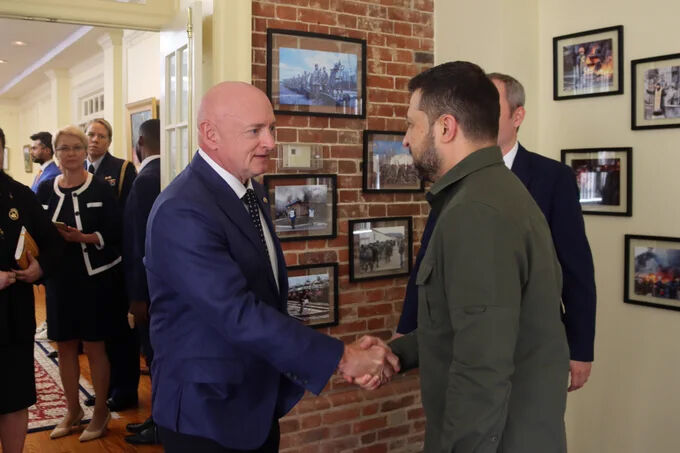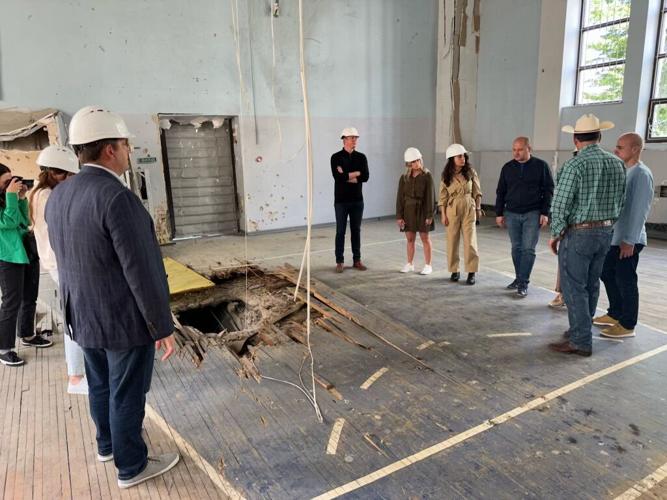A statewide coalition of Arizona defense-industry leaders has pledged to help Ukraine bolster its defense against Russia and rebuild in the future, under an agreement signed Thursday in Washington D.C.
The Arizona Defense and Industry Coalition and Ukraine’s Ministry of Strategic Industries signed the memorandum of understanding at the Ukrainian embassy in Washington D.C., with visiting Ukraine President Volodymyr Zelenskyy participating.
The pact is intended to support the development of joint ventures and production opportunities, forging connections between Ukraine and defense and mining entities in Arizona and other targeted U.S. states, the coalition said.
The agreement follows a June visit to Ukraine by members of the Phoenix-based Arizona Defense and Industry Coalition, or AZDIC, which was formed last year by military and defense-industry support groups including the Tucson-based Southern Arizona Defense Alliance.
“With AZDIC’s unmatched network of over 1,200 defense contractors and non-defense companies in Arizona, we knew we were in a unique position to help find actionable solutions for Ukraine,” said AZDIC President Lynndy Smith. “We appreciate Ukraine’s enduring partnership, and we look forward to supporting their cause through Arizona’s defense connections.”
Ukraine Minister of Strategic Industries Oleksandr Kamyshin thanked the Arizona coalition for its “steadfast commitment to Ukraine during this unjust war.”
“AZDIC’s dedication and role in facilitating conversations with essential defense technologies will not only ensure our success in the war, but also contribute significantly to our long-term resilience and progress,” Kamyshin said.
Following the signing, Zelenskyy also personally thanked Smith for AZDIC’s support.
Arizona Sen. Mark Kelly (D-Tucson) also was on hand at the signing event and met briefly with Zelenskyy, along with senior staff from the office of Sen. Kyrsten Sinema (I-Phoenix).
“Arizona has already played a critical role in supporting Ukraine’s defense against Russia’s illegal invasion, and this agreement will further strengthen our partnership while bolstering Arizona’s defense community,” Kelly, who recently returned from his second visit to Ukraine this year, said in prepared remarks.
Sinema said the AZDIC’s “leadership building strong connections between Ukraine and Arizona’s defense and mining industries will strengthen our national security, fuel strong Arizona careers, and expand economic opportunities for our state.”
Arizona aid
Arizona already is contributing to Ukraine’s defense, with defense contractors including Tucson-based Raytheon ramping up production of weapons the U.S. is supplying to Ukraine, such as the Javelin anti-tank missile and Stinger air-defense missile.
And the Air Force recently announced that a group of Ukrainian pilots will soon train to fly the F-16 Fighting Falcon at the Morris Air National Guard Base in Tucson, where the 162nd Wing has trained international pilots on the F-16 since the 1980s.
In June, an AZDIC delegation including Smith and Southern Arizona Defense Alliance President Robert Medler visited Ukraine for three days to meet with high-ranking leaders regarding defense technologies, reconstruction efforts, digital transformation, food security, educational and research and development opportunities.
The group also highlighted the state’s military installations and training, including the 162nd Wing’s decades-long history of training foreign pilots to fly the F-16.
“Arizona has a tremendous military base, both on the installation side and the training and operations side, and then on the industrial side,” Medler said. “We have all the main manufacturers, we have testing capabilities here, there’s a lot that we have to offer.”
Medler said the AZDIC group took the approach of simply asking their Ukrainian hosts what they need, now and in the future.
“I think that really surprised them that we weren’t coming to sell them a widget,” Medler said. “We were coming to ask them, what do you need and let’s see if we have something that’ll help.”

Lynndy Smith, executive director of the Arizona Defense and Industry Coalition, views a bombed-out building in Irpin, Ukraine, during a visit in June.
Ukrainian confidence
Medler said he was surprised by the Ukrainians’ focus on the long-term — spurred by their confidence in winning back their lands still occupied by Russia.
“Of course there were things for the short term they need assistance with, but the vast majority of what we heard was long-term,” he said. “It was, ‘Well when this conflict is done, and we’ve expelled the Russians... or when we’ve gotten our land back, here’s what we need.’”
Smith said major Arizona defense contractors including Raytheon, Boeing, General Dynamics as well as smaller suppliers could help Ukraine as it tries to convert its military arsenal from its base Soviet-era equipment to modern technology compatible with European Union and NATO member countries as it vies for membership in those alliances.
“They’re looking at it saying, ‘Well, how do we build back better and how do we build back with technologies from Western culture that set us up for entry into the EU and NATO?’” Smith said. “We’re obviously excited from a national security standpoint by having a closer ally in the region, but it also means a lot of opportunities for states like Arizona who could be providing a lot of the technology needed to get them in a place in which they could enter those entities.”
The Arizona delegation also got a firsthand look at a nation at war during the roughly weeklong trip that started in Rome, where they met for a briefing with Ambassador Cindy McCain, executive director of the United Nations World Food Programme, about how the ongoing global food crisis has been exacerbated by the war’s restriction of Ukrainian exports of critical wheat and grain supplies.
From there, the group went to Poland and because commercial flights over Ukraine and train tickets are scarce, they took a private car across the border to Liv, Ukraine.
Medler and Smith said they were impressed by the way Ukrainians went about their day-to-day business, but reminders of the war were never far away.
“For the most part, people were walking around, there were restaurants open and I was just incredibly surprised,” Smith said of her initial impressions of Liv. “And then you’d turn a corner and you’d see, all their statues and their government buildings like barricaded and, you’d start to see a little bit of this kind of war reality.”
And a couple weeks after the group returned, the residential area in Liv they had visited suffered major damage from a Russian bomb attack, she recalled.
During the group’s first meeting at the U.S. Embassy in Kyiv, cell phones around the room went off as an air-raid app warned of an impending attack, a nightly occurrence during the Arizona group’s visit, Smith said.
“Everybody has an app that they use for the air raids, and so it all goes off pretty much at the same time,” Medler said. “So they kind of roll their eyes and say, OK, we’re not leaving this room for awhile but this is a safe place, we didn’t have to go to shelter because it was a secure place.”
Medler said the group did have to seek shelter its last night in Kyiv, when an air-raid alert went off while they were at their hotel.
“There was a pretty long one, we had to go down to the parking garage and hang out for a couple hours,” he recalled.
Devastation and hope
While in Kyiv, the AZDIC group was taken on a tour of Irpin, a city on the western edge where the Ukrainians made a stand and kept Russia from taking the capital city, eventually ejecting the Russians from all of northern Ukraine.
Irpin was largely devastated, with bombed-out buildings and visible reminders of the battle and brief but brutal occupation clearly visible, Smith said.
The Arizona group was taken to a school where during the onset of the invasion a bomb went through a basketball court mere meters away from where about 150 people were hiding, she said.

A group from the Arizona Defense and Industry Coalition including Tucsonan Robert Medler, foreground left, view a hole left by a Russian munition at a school gymnasium in Irpin, Ukraine, during a visit in June.
“It was things like that — looking around at churches and houses and hospitals, and just every single one of them were filled with bullet holes,” Smith said.
But she said some Ukrainians told her that at some point, they start ignoring the air-raid sirens and go about their daily lives.
“They very much, kind of in a weird way, embrace it as part of their regular life, that it’s just reality that they can continue to fight,” Smith said. “There’s always going to be a risk, but they’re going to keep living their lives and Russia is not going to take that away from them.”
Several weapon systems made by Tucson-based Raytheon Missiles & Defense are helping Ukraine fend off Russia's invasion.






